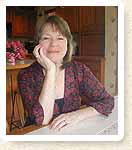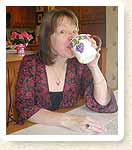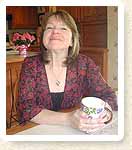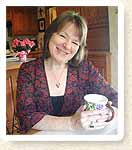



Personal blog of christian
writer & fallible mom
Katy McKenna Raymond
in Kansas City, Missouri

Katy is represented by
Greg Johnson at
WordServe Literary

Read more Katy at
LateBoomer.net




Our Grandparents Still Speak. Will We Listen?
One of my favorite things about listening to Dave Ramsey on the radio is when he says his tag line. “We give you the same advice your grandmother would, only we keep our teeth in.”
No matter how many times he says this, I smile. Because I am distinctly remembering things my grandparents taught me, and mottos they spoke and lived by. I’m talking about my mom’s parents here, by the way, since my father was an immigrant from Scotland and his parents were dead by the time he came to this country in 1946.
Baga (my father taunted my two-year-old self into attempting to call my grandmother “Old Bag,” and Baga is what I came up with. It stuck!) and Papoo (no, we weren’t Greek, but my older brother Patrick—-God rest his soul—-christened Grandpa, and his chosen name stuck, too) were two of the best role models a kid in the 50s and 60s could have possibly had.
Papoo was a college graduate, who worked 40 years as a CPA for the A&P grocery chain—-The Great Atlantic & Pacific Tea Company. He and Baga (whose given names were actually Carl and Bernice) married in 1925 and in 1930—-after the Great Depression had begun—-their only child, my mother, was born. A point of interest for me has always been that of the couples my grandparents were friends with over the years, many of them had only one offspring.
My mother (a Protestant by birth) married a Catholic and we kids were raised in the Catholic church. The only only child I ever knew was my own mother! But I wonder, as I look back at my grandparents’ lives and those of their contemporaries, whether many of them decided not to have more children because of the tenuous times in which they lived.
Unemployment in those bad old days, they say, reached 25% at its worst. Papoo, though, never missed a day of work. In 1935, the A&P transferred him to the office in Kansas City, where Mom grew up and still lives to this day. I’ve got to think that for my grandparents to have come of age in the flapper era and then to find themselves as young people in the midst of a national disaster must have been sobering, no matter how they cut it.
All I know for certain is that they were the hardest working, most resourceful people I’ve had the pleasure of knowing. My mother led an advantaged life, though I don’t think she quite sees it that way even still. She had dance lessons and piano lessons, and at the age of eight, she was given a magnificent grand piano that now graces the home of my youngest sister, Bridget. My grandparents were never ostentatious, but when they spent money, they purchased the highest quality items, intending to use them for a lifetime and then pass them down through the family.
I’ll just add that all my favorite pieces of furniture, I inherited from them. I LOVE having a black-and-white photo of my toddler-self standing in the middle of Baga’s velvet-upholstered Victorian settee that now graces my living room. The sense of continuity that comes from treasured objects that have spanned multiple generations of one family never ceases to comfort my soul.
During WWII, when my mother was in high school and they’d moved from the city to a house on five acres, my grandparents raised chickens. Lots and lots of chickens. They didn’t just raise them for the eggs, either. They slaughtered the darned things and sold them to all the nearby restaurants as an additional source of income. My mother still rues the day she got pulled into the chicken operation. All she wanted was to go rollerskating at the rink with her girlfriends on Saturdays, and instead she got stuck plucking the feathers out of chickens for a few years running.
Papoo even wrote a book about how to raise chickens, self-published it, and sold 5000 copies through mail order. It was a true kitchen table enterprise, garnering them even another stream of income. Sure, Baga did the patriotic thing and worked in a factory during that time, and I have in my possession some leftover ration coupons to prove they lived under the same constraints as other citizens. But they always managed to hang on to entrepreneurial spirits, which served them fabulously well their whole lives.
In 1947, they moved into a beautiful house they had build on 160 acres. Maybe they should not have moved in as soon as they did, since the first winter in the house they had no central heat. In fact, much was unfinished when they took up residence, but they weren’t deterred. And they stubbornly refused to borrow money to build the house. It was cash on the line, baby, or no house for them! I believe they miscalculated that they would have the cash to put in the heater before the snow flew, and paid for it all winter with the shivers.
But a miscalculation was not an excuse to go into debt. One of the things Papoo told me solemnly in a moment we shared driving down the road when I was 12 or so was this, “Whatever you do, Kate, NEVER take out a mortgage!” Trust me on this, he was NOT talking about a home equity line of credit. He meant a FIRST mortgage. He must have been mortified that my parents took out a 20-year mortgage on the house I grew up in, even though they DID pay it off in 11 years.
When I graduated from high school, Papoo bought me a brand spankin’ new car. A 1972 purple Gremlin. I named her Kiki. I will never forget the shock on the car salesman’s face when my grandfather counted out twenty-five $100 bills to pay for that purchase. It went without saying that I should NEVER take out a loan to purchase a car!
Baga once felt the need to give me this salient piece of wisdom: “There’s never a reason for you or your clothing or your home to be dirty. A bar of soap still costs a nickel, and anyone can afford a nickel.” That lady scrubbed us, herself, the laundry (can we say “wringer washer”?) and her white tile and grout to within an inch of our lives.
Papoo, before a massive heart attack forced him to retire at age 59 and he began sub-dividing his property into 1/3 acre homebuilding sites, raised Black Angus cattle for the family’s consumption. I felt bad when I realized I was being served Debbie, Mary Jo, or Claudia, but the homegrown corn-on-the-cob we picked and cooked right before dinner and the ice cream made with peaches from Baga’s trees softened the news considerably.
What I’m trying to say is that my grandparents married and raised a daughter in tough times. They lived through the Great Depression and then WWII, and while they did not go through the type of suffering so many did, they were careful to structure their habits in such a way as to ensure the family’s well-being. For them, that meant NO debt EVER. It meant a substantial amount of savings to see them through a crisis. It meant always thinking up and implementing supplemental strategies for income, to protect them in case their primary source of funds were cut off.
It also meant passing on the homespun wisdom that served them well, and making sure their daughter and grandchildren were educated in the principles of living well within our means.
Let me just say that in these days, I’ve been thinking of them a lot. And cherishing the example they gave me, since of them it could truly be said that they practiced what they preached.
Any wisdom you’ve been handed down that is serving you well during this economic downturn? No sense in putting it to waste! Feel free to share it here.
- These grandparents sound like those on my paternal side--they purchased their first car with cash in the midst of the Depression on one, school teacher's salary!
Posted by Terri on 03/22/09 at 08:29 PM
- Prioritization and delayed gratification. For me, frequent dinners out are not as important as some longer-term financial goals or supporting certain charities/ministries, for example.
Gas over here being about 70 cents a gallon on a bad day helps (except that I don't drive here, but it helps others) and the Good Lord showed me through so many ways how to manage my finances while I was young and impressionable. I am very grateful for the state of my financial life.
The only thing is, how is a younger person or couple supposed to purchase a home without a mortgage? My Grandfather was very disappointed in me when I finally financed a car (at 26 years old and with a very stable income), but I had not had such a financial life that I could have saved enough to pay cash for it, and the used-car route was putting my job at risk. So if I had to cave and finance a car (which will be paid off by May, three and a half years early!), how in the world would I be able to buy a home without a mortgage? Seriously, I'd be interested to know.
Meanwhile, I have put enough into savings over here, that if I could somehow live like this another ten years, I suppose I could do just that if I were blessed with the same financial advantages I've had while in the Navy and didn't need to purchase a home before then....Posted by PattyT on 03/24/09 at 02:01 PM - We are paying are mortgage off as quick as we can not the base rte has dropped
Posted by Mortgage advisor on 05/27/09 at 09:36 AM
- I think it means passing on the homespun wisdom that served them well, and making sure their daughter and grandchildren were educated in the principles of living well within our means.
Posted by Benches and Storage adam on 06/08/09 at 06:45 AM
- What I’m trying to say is that my grandparents married and raised a daughter in tough times. They lived through the Great Depression and then WWII, and while they did not go through the type of suffering so many did, they were careful to structure their habits in such a way as to ensure the family’s well-being. For them, that meant NO debt EVER. It meant a substantial amount of savings to see them through a crisis. It meant always thinking up and implementing supplemental strategies for income, to protect them in case their primary source of funds were cut off.
Posted by prestamos hipotecarios on 07/14/09 at 03:33 PM
- How many people still speak and write Sanskrit in India?
Is it a difficult language? How many years to be perfect?Posted by offshore bank accounts on 07/29/09 at 02:38 PM - That is one great thank leaning! Thank you for your accomplished sense of witticism and benignity.
<a href="http://www.adagiointeriors.com/">Vinyl Wall Stickers</a>Posted by Mark on 05/03/10 at 01:01 AM - Cash flow is a generic term used differently depending on the context. It may be defined by users for their own purposes. It can refer to actual past flows, or to projected future flows. It can refer to the total of all the flows involved or to only a subset of those flows.
Posted by Forex Trading Reviews on 02/12/11 at 01:45 AM
- We are paying are mortgage off as quick as we can not the base rte has dropped.
Posted by Offshore Library on 04/06/11 at 03:47 PM
Next entry: Spring Has Sprung!
Previous entry: Right Of Refusal
